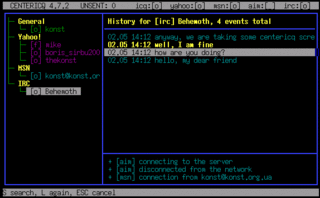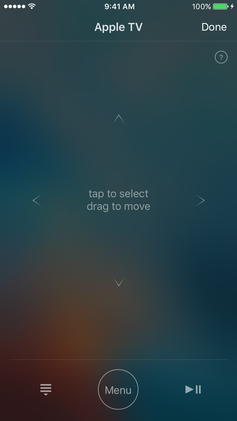
Dave Winer is an American software developer, entrepreneur, and writer who resides in New York City. Winer is noted for his contributions to outliners, scripting, content management, and web services, as well as blogging and podcasting. He is the founder of the software companies Living Videotext, Userland Software and Small Picture Inc., a former contributing editor for the Web magazine HotWired, the author of the Scripting News weblog, a former research fellow at Harvard Law School, and current visiting scholar at New York University's Arthur L. Carter Journalism Institute.

UserLand Software is a US-based software company, founded in 1988, that sells web content management, as well as blogging software packages and services.

Centericq is a text mode menu- and window-driven instant messaging interface that supports the ICQ, Yahoo!, AIM, MSN, IRC, XMPP, LiveJournal, and Gadu-Gadu protocols.
Remote Desktop Protocol (RDP) is a proprietary protocol developed by Microsoft Corporation which provides a user with a graphical interface to connect to another computer over a network connection. The user employs RDP client software for this purpose, while the other computer must run RDP server software.
Mike "Pink" Pinkerton is an American software engineer who is known for his work on the Mozilla browsers. He lectures on Development of Open Source Software at George Washington University.

Colloquy is an open-source IRC, SILC, ICB and XMPP client for Mac OS X. Colloquy uses its own core, known as Chat Core, although in the past it used Irssi as its IRC protocol engine. One of the primary goals behind Colloquy was to create an IRC, SILC and ICB client with Mac OS X visuals. Colloquy contains a user interface that follows Apple's Human interface guidelines in addition to containing support for traditional IRC command-line controls such as /nick and /join.
Radio UserLand is a software package from UserLand Software, first released in 2000, which includes not only a client-side blogging tool but also an RSS aggregator, an outliner and a scripting language.

Apple Remote Desktop (ARD) is a Macintosh application produced by Apple Inc., first released on March 14, 2002, that replaced a similar product called Apple Network Assistant. Aimed at computer administrators responsible for large numbers of computers and teachers who need to assist individuals or perform group demonstrations, Apple Remote Desktop allows users to remotely control or monitor other computers over a network. Mac Pro (2019), Mac mini with a 10Gb Ethernet card, and Mac Studio (2022) have Lights Out Management function and are able to power-on by Apple Remote Desktop.
Weblogs, Inc. was a blog network that published content on a variety of subjects, including tech news, video games, automobiles, and pop culture. At one point, the network had as many as 90 blogs, although the vast majority of its traffic could be attributed to a smaller number of breakout titles, as was typical of most large-scale successful blog networks of the mid-2000s. Popular blogs included Engadget, Autoblog, TUAW, Joystiq, Luxist, Slashfood, Cinematical, TV Squad, Download Squad, Blogging Baby, Gadling, AdJab, and Blogging Stocks.
This is a list of blogging terms. Blogging, like any hobby, has developed something of a specialized vocabulary. The following is an attempt to explain a few of the more common phrases and words, including etymologies when not obvious.
This is a comparison of voice over IP (VoIP) software used to conduct telephone-like voice conversations across Internet Protocol (IP) based networks. For residential markets, voice over IP phone service is often cheaper than traditional public switched telephone network (PSTN) service and can remove geographic restrictions to telephone numbers, e.g., have a PSTN phone number in a New York area code ring in Tokyo.

Parallels Desktop for Mac is software providing hardware virtualization for Macintosh computers with Intel processors, and since version 16.5 also for Apple silicon-based Macintosh computers. It is developed by Parallels, since 2018 a subsidiary of Corel.
This page is a comparison of notable remote desktop software available for various platforms.

MediaFire is a file hosting, file synchronization, and cloud storage service based in Shenandoah, Texas, United States. Founded in June 2006 by Derek Labian and Tom Langridge, the company provides client software for Microsoft Windows, macOS, Linux, Android, iOS, BlackBerry 10, and web browsers. MediaFire has 43 million registered users and attracted 1.3 billion unique visitors to its domains in 2012.
Remote Desktop Services (RDS), known as Terminal Services in Windows Server 2008 and earlier, is one of the components of Microsoft Windows that allow a user to initiate and control an interactive session on a remote computer or virtual machine over a network connection. RDS was first released in 1998 as Terminal Server in Windows NT 4.0 Terminal Server Edition, a stand-alone edition of Windows NT 4.0 Server that allowed users to log in remotely. Starting with Windows 2000, it was integrated under the name of Terminal Services as an optional component in the server editions of the Windows NT family of operating systems, receiving updates and improvements with each version of Windows. Terminal Services were then renamed to Remote Desktop Services with Windows Server 2008 R2 in 2009.

iTunes Remote is a software application developed by Apple Inc. for iOS devices that allows for remote control of Apple TV or iTunes library in an area with Wi-Fi connectivity using the proprietary Digital Audio Control Protocol (DACP). It is currently available as a free download from the App Store for iOS devices such as iPhone, iPod Touch, iPad, and Apple Watch.

Mendeley is a reference manager software founded in 2007 by PhD students Paul Foeckler, Victor Henning, Jan Reichelt and acquired by the Dutch academic publishing company Elsevier in 2013. It is used to manage and share research papers and to generate bibliographies for scholarly articles.
An app store, also called an app marketplace or app catalog, is a type of digital distribution platform for computer software called applications, often in a mobile context. Apps provide a specific set of functions which, by definition, do not include the running of the computer itself. Complex software designed for use on a personal computer, for example, may have a related app designed for use on a mobile device. Today apps are normally designed to run on a specific operating system—such as the contemporary iOS, macOS, Windows, Linux or Android—but in the past mobile carriers had their own portals for apps and related media content.

Cryptocat is a discontinued open-source desktop application intended to allow encrypted online chatting available for Windows, OS X, and Linux. It uses end-to-end encryption to secure all communications to other Cryptocat users. Users are given the option of independently verifying their buddies' device lists and are notified when a buddy's device list is modified and all updates are verified through the built-in update downloader.

Chrome Remote Desktop is a remote desktop software tool, developed by Google, that allows a user to remotely control another computer's desktop through a proprietary protocol also developed by Google, internally called Chromoting. The protocol transmits the keyboard and mouse events from the client to the server, relaying the graphical screen updates back in the other direction over a computer network. This feature, therefore, consists of a server component for the host computer, and a client component on the computer accessing the remote server. Chrome Remote Desktop uses a unique protocol, as opposed to using the common Remote Desktop Protocol.










